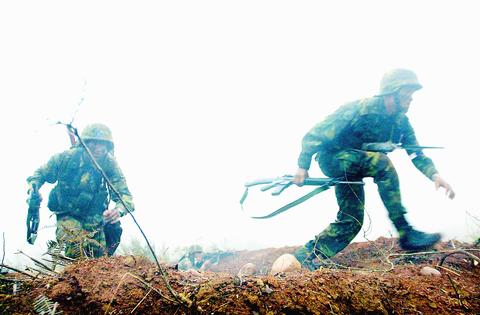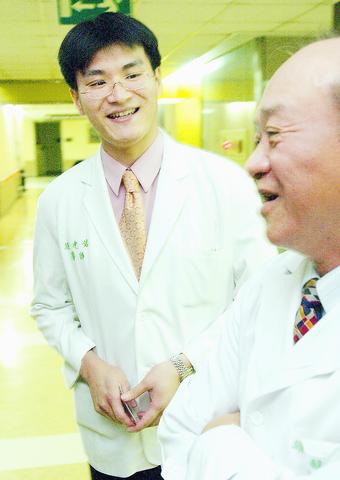Is serving in the army an honor? In the past the answer may have been "yes" but now most men think otherwise.
In Taiwan, many men do everything they can to escape the 22 months of compulsory military service. Medical students are said to be the most notable draft dodgers since their training makes it easier for them to evade service than other people; with their professional medical knowledge they can identify the physical ailments that meet the official criteria for exemption from the obligatory service.
This long-standing problem recently caught the media's attention again when it was rumored that physician Chao Chien-min (趙建銘), President Chen Shui-bian's (陳水扁) future son-in-law, had allegedly dodged military service by using fraudulent documents. In a special press conference this week, the Ministry of National Defense denied the rumor. Chao is said to suffer from gout.

TAIPEI TIMES FILE PHOTO
Still, a high proportion of those exempt from military service are medical students. A recent report released by the government's watchdog, the Control Yuan, showed that between 1995 and 1999, of the 3 percent (6,822 individuals) of all males who were judged to be physically unfit for military service, nearly 31 percent were medical students -- or 1,226 individuals.
Common reasons for exemption from military service, according to the report, include being overweight or underweight, having substandard eyesight, suffering from respiratory diseases such as asthma, cardiac diseases, or metabolic disorders like gout.
Nothing improper

TAIPEI TIMES FILE PHOTO
"I don't think [medical students] are trying to simulate or fake physical afflictions to evade the country's mandatory military service. The reason for [the higher percentage of medical students being exempted from the service] is probably our understanding of the human body," said Lien Chia-en (連加恩), a medical student at National Yang Ming University.
This means that many men drafted for military service may actually have a medical condition that would exempt them from service but they are unaware of it.
Currently serving as an internist for the last year of his medical studies, Lien told the Taipei Times that there are over 200 medical conditions that exempt individuals from military service.
"Reading the list is like studying an entire medicine textbook. There is a popular saying on campus, `Only lazy students go to serve in the army,'" Lien said jokingly, adding that if one tries hard enough, it is not too difficult to find some sort of physical indisposition to skip military service.
In most cases, in order to be exempted from military service, medical students make use of physical ailments which are more difficult for the layman to identify because of his lack of medical knowledge, Lien said.
"Thalassemia, a kind of genetic anemia, is a good example. An individual may suffer from thalassemia without knowing it, because there are frequently no obvious symptoms," he explained. "And there is spontaneous pneumothorax, a lung disease which does not bother patients if no severe symptoms occur. But people with either of the two illnesses will not be able to endure rigorous army training if symptoms break out."
Another medical student, who requested anonymity, agreed.
"It's just like accountants knowing better how to save on taxes, or lawyers knowing how to win legal suits given their understanding of the law. I don't see why medical students should be accused for making good use of their professional knowledge to be excused from army service, as long as lawful procedures are followed," he said.
Health comes first
As for rumors that students may take medicine temporarily to change their physical conditions in order to avoid the draft, most of those interviewed by the Taipei Times, students and professors alike, dismissed the allegations.
However, doctors conceded that it was difficult to tell by examination whether those being examined had taken medication before a check-up.
"Check-ups only reveal the facts at the time of the examination," Wang Wei-tien (王維典), a physician in the department of family medicine at National Taiwan University Hospital, said. Yet he did not consider abuse of taking medication a widespread practice. "I don't think students would be so foolish as to run the risk of permanently damaging their bodies just to evade the two-year military service. Precisely because they know how vulnerable the human body is, they would tend not to make such a dumb move."
Chang Teh-ming (
When asked whether it was possible for doctors to fake documents for their associates, the rheumatologist was quick to brush aside such speculation.
"Conscripts have to go through at least two physical check-ups before they are assessed to be physically unfit for service. The first one is held at a regular hospital, the second one at a military hospital," Chang said. "Any medical officer, if found to be conspiring with those being examined, will be tried in a military court. There are harsh punishments."
Fair system needed
Other physicians said that debate should not center on medical students' advantage of having better medical knowledge. What deserves more attention, they said, was how to achieve impartiality in the current system.
Some commended the introduction of alternative service, while others suggested changing the existing conscription system and doing away with draft.
"There is no point in accusing medical students for what they do within the scope of law. Alternative service, however, is a good scheme for getting round the pitfalls of the current system," said physician Lin Yu-jung (
The program, which came into effect last July, offers four alternatives to the 22-month military service, including social work, police work, fire fighting and environmental protection work.
Those deemed physically unfit for regular army training but are not too seriously ill are among those who are eligible to apply for alternative service. Followers of certain religions, for example Jehovah's Witnesses, are also exempt from regular service.
Chung Tai-li (
The defense ministry is currently looking into the possibility of doing away with draft five years from now, but has yet to reach any formal conclusions on how it would carry out such a massive reform.
"Conscription is still the most feasible system under current circumstances. What [the defense ministry] can do in due course, however, is to recruit more enlisted soldiers, and concurrently reduce the number of conscripts," he said.
Taiwan currently has 380,000 servicemen, about 100,000 of whom are career soldiers.
"In my view, a more crucial point is that the notion needs to be ingrained in the minds of youngsters that serving in the army is not only a duty that citizens must perform, it is also a great honor," he said.

LONG FLIGHT: The jets would be flown by US pilots, with Taiwanese copilots in the two-seat F-16D variant to help familiarize them with the aircraft, the source said The US is expected to fly 10 Lockheed Martin F-16C/D Block 70/72 jets to Taiwan over the coming months to fulfill a long-awaited order of 66 aircraft, a defense official said yesterday. Word that the first batch of the jets would be delivered soon was welcome news to Taiwan, which has become concerned about delays in the delivery of US arms amid rising military tensions with China. Speaking on condition of anonymity, the official said the initial tranche of the nation’s F-16s are rolling off assembly lines in the US and would be flown under their own power to Taiwan by way

OBJECTS AT SEA: Satellites with synthetic-aperture radar could aid in the detection of small Chinese boats attempting to illegally enter Taiwan, the space agency head said Taiwan aims to send the nation’s first low Earth orbit (LEO) satellite into space in 2027, while the first Formosat-8 and Formosat-9 spacecraft are to be launched in October and 2028 respectively, the National Science and Technology Council said yesterday. The council laid out its space development plan in a report reviewed by members of the legislature’s Education and Culture Committee. Six LEO satellites would be produced in the initial phase, with the first one, the B5G-1A, scheduled to be launched in 2027, the council said in the report. Regarding the second satellite, the B5G-1B, the government plans to work with private contractors

MISSION: The Indo-Pacific region is ‘the priority theater,’ where the task of deterrence extends across the entire region, including Taiwan, the US Pacific Fleet commander said The US Navy’s “mission of deterrence” in the Indo-Pacific theater applies to Taiwan, Pacific Fleet Commander Admiral Stephen Koehler told the South China Sea Conference on Tuesday. The conference, organized by the Center for Strategic and International Studies (CSIS), is an international platform for senior officials and experts from countries with security interests in the region. “The Pacific Fleet’s mission is to deter aggression across the Western Pacific, together with our allies and partners, and to prevail in combat if necessary, Koehler said in the event’s keynote speech. “That mission of deterrence applies regionwide — including the South China Sea and Taiwan,” he

‘NARWHAL’: The indigenous submarine completed its harbor acceptance test recently and is now under heavy guard as it undergoes tests in open waters, a source said The Hai Kun (海鯤), the nation’s first indigenous defense submarine, yesterday began sea trials, sailing out of the Port of Kaohsiung, a military source said. Also known as the “Narwhal,” the vessel departed from CSBC Corp, Taiwan’s (台灣國際造船) shipyard at about 8am, where it had been docked. More than 10 technicians and military personnel were on deck, with several others standing atop the sail. After recently completing its harbor acceptance test, the vessel has started a series of sea-based trials, including tests of its propulsion and navigational systems, while partially surfaced, the source said. The Hai Kun underwent tests in the port from